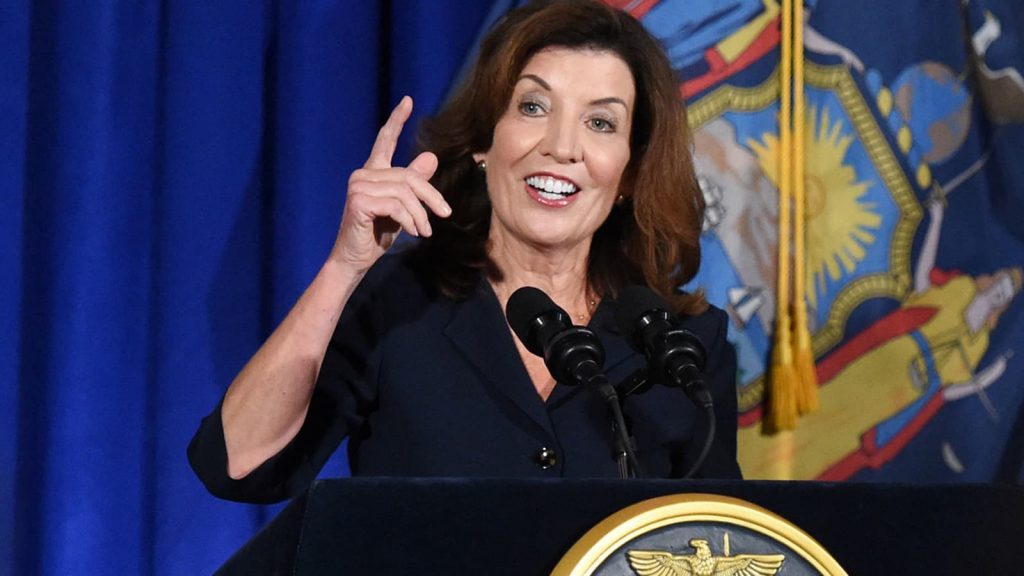Advocating a pause in tax increases, Gov. Kathy Hochul released her $233 billion proposal for New York state’s 2025 fiscal year budget last month. The proposal came weeks earlier than the release of last year’s budget plan, which was marked by delays and finally passed over a month after the April 1 deadline.
The budget process begins with the governor’s proposal, which is discussed with leaders of the State Legislature. Both the State Senate and the State Assembly then have until March 31 to agree on a final proposal, one of the tightest windows of any state.
With a $2.2 billion budget surplus, Hochul expressed hesitation to increase taxes to avoid future projected deficit spending. The move was criticized by progressive groups, like the Working Families Party, and legislators, including State Sen. Jessica Ramos of Queens, who previously said that refusing to increase taxes on the wealthy did not make “mathematical sense.”
“Perhaps the notion is that we shouldn’t find creative ways to tax the middle class New Yorkers to drive them away,” Ramos said. “We should be taxing the rich so that we can provide every single child in New York state with a sound education, starting with the universal child care.”
Hochul’s budget — while including an $825 million increase in K-12 school aid — decreases funding for 44 percent of school districts in the state and removes a funding provision that prevents cuts to school districts’ annual state aid. The change was condemned by public education advocates and officials like Assemblywoman Donna Lupardo, who expressed her concerns with Hochul’s K-12 education funding proposal, and Melinda Person, the president of the New York State United Teachers Union.
The governor’s proposal allocated $100 million in annual SUNY funding. Lupardo addressed the need for increased funding allocated to the tuition assistance program and for SUNY community colleges.
“As a member of the Assembly Higher Education Committee, I’m OK with the [governor’s] higher education budget as a starting point,” Lupardo wrote in an email. “There will likely be the need for additional capital investments, especially for [university centers] like BU. As for Assemblymember Forrest’s [free SUNY tuition legislation], [it’s] hard to argue with the [many] benefits this would provide to students. However, the bill currently lacks a [State] Senate sponsor and is missing an analysis of the fiscal impact this would have on the state budget and the SUNY system as a whole.”
Thomas Cipro, a senior majoring in history, praised the $4.8 billion allocation for mental health funding in the governor’s proposal.
“I find it reassuring to see Hochul committing more money toward mental health resources and education,” Cipro wrote. “Hopefully, our [University] can take inspiration from this sort of initiative.”
Hochul remains committed to her “New York Housing Compact,” which failed last year due to suburban opposition to building more housing. This time, Hochul has eliminated a central part of the proposal — housing mandates that would override local zoning laws to build new homes — out of fear of potential suburban backlash during an election year.
“While I am happy to see the governor’s priorities including adding to our housing stock, we must also enact protections for renters and ensure that housing is truly affordable for all New Yorkers,” Lea Webb, who represents Greater Binghamton in the State Senate, said.
Since last year’s state budget negotiations, Hochul’s opposition to State Sen. Julia Salazar and Assemblywoman Pamela Hunter’s Good Cause Eviction legislation has led to conflict with progressives in the legislature over two competing visions over housing — Hochul’s incentives to developers and the progressives’ support of tenant protections. The bill includes provisions that would require landlords to justify rent increases over three percent and would give tenants the ability to challenge certain types of evictions in court.
Further, Housing Justice for All, a statewide coalition of pro-tenant and homeless organizations in New York state, rebuked the governor’s housing plan for its lack of tenant protections and incentives to real estate developers.
“We need a robust social housing program that would create affordable, [high-quality] homes for all New Yorkers,” the group wrote in a statement. “Tenants will not stand for an ineffective housing compromise that combines [watered-down] tenant protections with failed developer handouts.”



